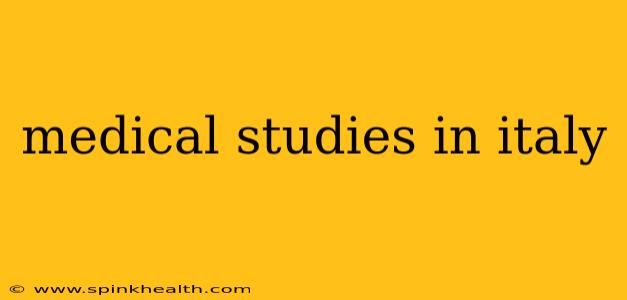Italy, a land steeped in history and culture, also boasts a rich tradition of medical excellence. From ancient Roman medicine to cutting-edge research today, Italy's contribution to the medical field is undeniable. This journey will explore the vibrant landscape of medical studies in Italy, addressing common questions and highlighting what makes this European nation a compelling choice for aspiring medical professionals.
What are the best medical schools in Italy?
Choosing the "best" medical school depends heavily on individual priorities and research interests. However, several consistently rank highly and enjoy strong international reputations. Universities like the University of Milan, Sapienza University of Rome, and the University of Padua are frequently cited for their rigorous programs, advanced research facilities, and accomplished faculty. These institutions offer a diverse range of specializations and opportunities for students to engage in groundbreaking research. It’s crucial to research individual programs within these universities to find the best fit for your specific goals. Look for programs with strong faculty research profiles aligned with your interests and opportunities for clinical exposure.
What is the language of instruction for medical studies in Italy?
While some universities may offer introductory courses in English, the primary language of instruction for medical studies in Italy is Italian. A strong command of the Italian language is, therefore, essential for successful completion of the program. This includes not only understanding lectures and textbooks but also interacting with patients and collaborating with colleagues in clinical settings. Prospective students lacking sufficient Italian proficiency should plan to dedicate time to intensive language study before commencing their medical studies.
How long does it take to become a doctor in Italy?
The medical degree program in Italy typically lasts six years. This intensive program covers a wide range of medical subjects, providing a strong theoretical and practical foundation in medicine. After completing the six-year program, graduates must then complete a period of specialization, lasting anywhere from three to five years depending on the chosen specialty. Only after completing both the degree program and the specialization can a medical graduate fully practice as a specialist doctor in Italy.
What are the admission requirements for medical schools in Italy?
Admission to medical schools in Italy is competitive. Requirements vary slightly between universities but generally include a high school diploma (or equivalent) and a high score on the Test di accesso a medicina e chirurgia (TOLC-MED), a national entrance examination. This examination tests students’ knowledge of biology, chemistry, physics, and logic. International students will also need to fulfill additional requirements, including proof of Italian language proficiency and possibly the validation of their high school diplomas. The specifics of admission requirements should always be checked directly with the university to which you intend to apply.
What are the job prospects for doctors in Italy?
Italy's healthcare system offers various job opportunities for doctors. The demand for medical professionals remains relatively strong, though the specific career paths and job market conditions can vary depending on specialization and geographical location. While some regions may face a shortage of certain specialists, competition for positions in highly sought-after fields can be keen. Networking and gaining relevant clinical experience during the specialization period are valuable in securing a favorable position after graduation.
Are there scholarships available for medical students in Italy?
Yes, several scholarships and financial aid opportunities are available for medical students in Italy, both for Italian and international students. These can be offered by the universities themselves, government bodies, or private organizations. Searching for scholarships specific to medical studies in Italy, or scholarships for international students in Italy, will reveal a range of possibilities. Early research is advisable as deadlines and eligibility criteria vary significantly.
What is the cost of studying medicine in Italy?
The cost of studying medicine in Italy varies depending on the university and whether the student is a resident of Italy or an international student. Tuition fees for Italian citizens are usually considerably lower than for international students. Additionally, living expenses in Italy can also vary depending on location, with major cities generally being more expensive. Prospective students should carefully budget for tuition fees, living expenses, and other associated costs before making their application.
This exploration provides a starting point for those interested in pursuing medical studies in Italy. The path to becoming a doctor is challenging but rewarding, and Italy, with its rich medical heritage and commitment to innovation, presents a unique and compelling option for aspiring physicians worldwide. Remember to thoroughly research specific universities and programs to ensure they align with your individual ambitions and capabilities.

